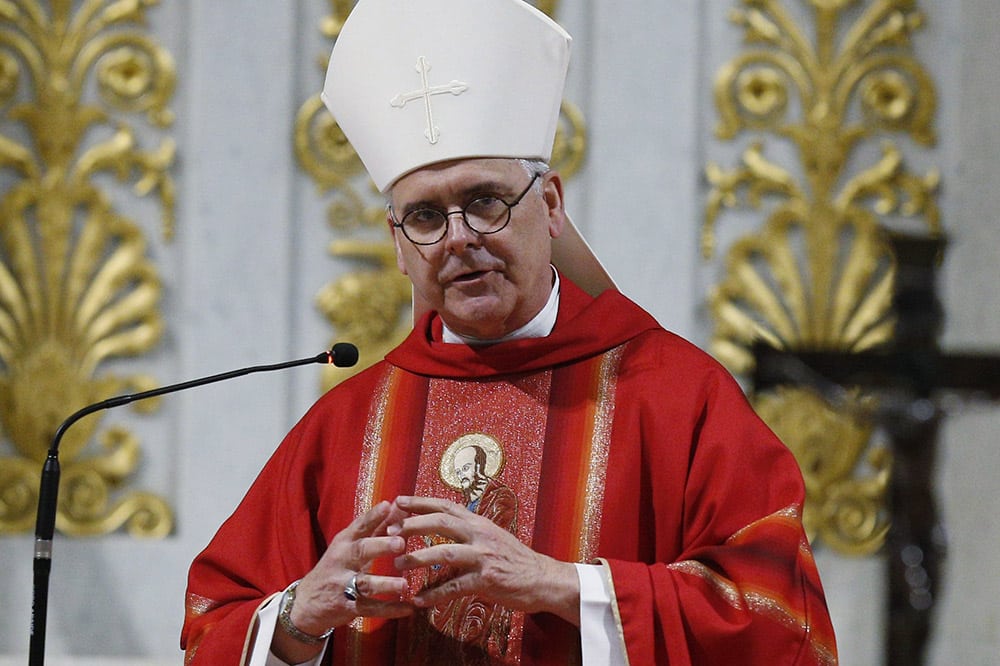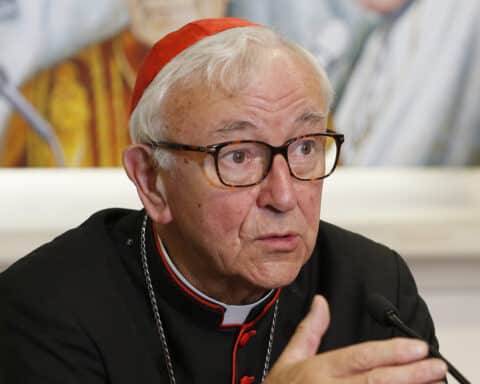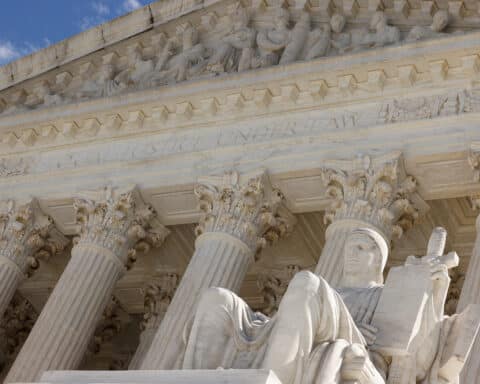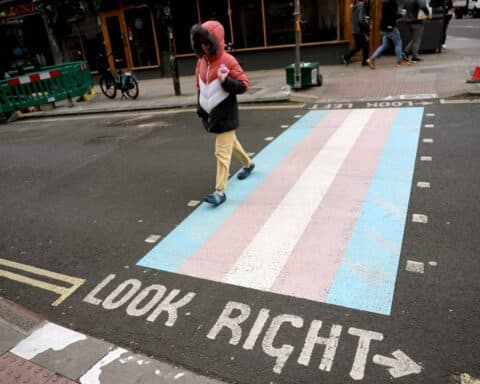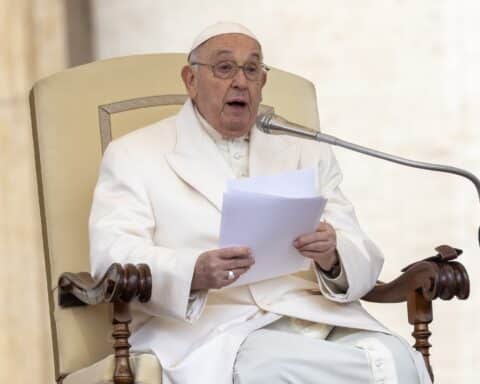Archbishop Paul S. Coakley of Oklahoma City released a pastoral letter this May addressing gender dysphoria and questions around sexual identity. The timing of the letter coincided with an Oklahoma bill that restricts “gender-changing” medical procedures for minors. That bill was signed into law by Gov. Kevin Stitt on May 1.
Archbishop Coakley’s letter examines the question of “gender identity” through the lens of Christian belief and Catholic teaching, inviting discussion and study while emphasizing the need for God’s revelation and openness to the truth. The archbishop emphasizes the importance of reflection on philosophy and theology to help Catholics navigate current questions around gender dysphoria in society.
The archbishop sat down with Our Sunday Visitor to discuss the letter, his pastoral approach to people suffering from gender dysphoria and what Catholics can and should do when they encounter questions about gender today.
This interview has been edited for length and clarity.
Our Sunday Visitor: Why was it important for you to release a pastor letter addressing “transgenderism” at this time?
Archbishop Paul S. Coakley: I think there’s simply so much confusion because the whole issue has been driven with such determination by the media and our culture that a lot of good, faithful Catholics are wondering where the Church stands and how to respond to this. Young people especially are confused because they’re great consumers of social media, which tells them that this is a normal thing. Parents, teachers and school principals are wondering how to respond when students or their own children come home with requests to begin “transitioning” or to change pronouns.
You know, we’ve had questions and issues here in our diocese, especially where principals are wondering how to handle situations in Catholic schools. We have one situation that presented itself just in the last week or two regarding a student who would be graduating from one of our Catholic high schools. The student wishes to go by a different name that aligns with the student’s preferred “gender identity,” so we had to be prepared to respond to these kinds of questions in a consistent way.
The confusion so rife in society at this moment seems to have come out of nowhere and has caught everyone off guard. So, I felt the need to develop something to help provide some guidance, primarily for the people here in our own archdiocese, but it has certainly moved beyond that.
Our Sunday Visitor: How has the letter been received in your own archdiocese?
Archbishop Coakley: In terms of what has come back to me, it’s been pretty positive. There’s been some pushback but not primarily from local sources. Opposition has come more from people that have read the pastoral letter through their own access to it on the Internet, social media posts and whatnot. But I think locally it’s been pretty well received, maybe not 100% support, but I think there’s an appreciation for the clarity that I’m at least attempting to bring.
Our Sunday Visitor: One of the things that you didn’t mince words on in the letter was the examination of the philosophical trends that underlie the “transgender” movement. This is difficult for most people to talk about. What do you think are the keys, philosophically speaking, that are behind our Catholic response to all these questions about gender dysphoria today?
Archbishop Coakley: One of the things that I mentioned in the letter is an underlying dualism that, philosophically, is very much a part of the inability to accept the body-soul composite, which is constitutive of the human person. Dualism is rife in our society and our culture, and I think that’s one of the first things that comes to mind. There’s a real inability and unwillingness, I think, to accept the fact that we are created beings. We want to be able to create ourselves. There’s a real lack of an adequate anthropology to undergird people’s thinking about the question of gender.
Our Sunday Visitor: One of the things I was most struck by was the very pastoral and compassionate tone of your letter. I think there are a lot of people that are facing questions about how to respond to “transgender”-identifying people in their lives, and you get into some of the practical questions Catholics are running into in daily life. Can Catholics support “gender-affirming care”? In your estimation, can we use preferred pronouns? How do we handle some of the situations that are coming up every day?
Archbishop Coakley: Well, I think the important thing is to be engaging and communicative with people. I advise parents saying: This shouldn’t be the only thing that they’re communicating with their child about. They need to have a relationship that is based upon good, solid communication, so that when difficult topics come up, that one thing does not become the total focus of their relationship.
I’m pretty insistent that it’s not a helpful thing to use preferred pronouns if those stated pronouns are different from a person’s biological sex. I just don’t think that’s a helpful, honest way to address the situation and to build trust in a relationship. And relationships have to be based on truth. Otherwise, as Pope Benedict says, it descends into just sentimentality, which, I’m afraid, happens all too often.
My letter was really intended to be a pastoral statement in support of the people for whom this is a real point of suffering and pain. I want the public to understand that the Church cares about people who are struggling with gender dysphoria and that we want to accompany them. We want to support them, but ultimately we want to lead them to Christ in the truth of his love for them.
Our Sunday Visitor: Catholics responding to the questions posed by “transgender” ideology may not know where to turn, especially when it comes to politics. It seems that one political party is incredibly supportive of so-called “gender affirming care” right now, and another is largely against it. Do you have any advice for navigating the political scene or, for that matter, the workplace?
Archbishop Coakley: I know here in Oklahoma we’re a very red state. There’s a prohibition of “gender-affirming care” for minors that has just recently passed our legislature and was signed into law by our governor. That may not be possible in a lot of states these days.
Perhaps I’m not the best person to discuss workplace ethics, because I’m not having to deal with that here. We’re pretty clear with our own schools and our parishes how we’re addressing this, but in the world beyond the Church, I’m sure this is a very sensitive matter. And yet, I don’t think that the approach ought to be much different than it would be within the Church, and that is, I think the principles are the same: Gender cannot be completely separated from biological sex, and they’re distinct, but they’re not separate. So I want to advise people in the workplace — to the extent that they are able within the constraints of the law — to hold that line. We must be firm and clear that it is not a helpful thing to blur this distinction in people’s lives that is so much rooted in the biological reality of who we are and our created human nature.
In the workplace, if I were to use someone’s preferred pronouns which differ from that person’s biological sex, I think that would be cooperating with something I don’t believe in.
Our Sunday Visitor: Many people are wondering: What is the Church doing about “transgenderism”? What do you think are the most promising ways forward for the Church on this issue?
Archbishop Coakley: I think we need to be able to articulate the truth of our position and stay rooted in professing the truth in charity. We have to reclaim the narrative, if you will. And I think there’s various ideologies that are so common and prevalent in our society, which are very insistent about rewriting the narrative. We need to be rooted in who we are as Catholics and in the anthropology that undergirds our vision of the human person. We need to be able to articulate that and hold to that vision and not be swayed by the various public opinions that are rife in our society today. We must remain true disciples, rooted and steadfast in the truth, but always in a loving and compassionate way. We can bear witness to the truth in our interactions with others. We can speak the truth in a way that demonstrates a real understanding and compassion for people that might be suffering.
Often, we have these conversations in terms of Catholic health care. I’m referring to the doctrinal note recently put out by the bishops’ Committee on Doctrine about what is and what’s not possible to do in a Catholic health care institution concerning the manipulation of the body in light of “gender identity.” But I think the Church is doing a lot. We are a very significant player in public life, whether it’s in health care or whether it’s in education. We’re doing what we can do, and I think we’re doing it consistently, at least for the most part. I think we need to simply continue doing that without apology.

